"Better advocacy comes from organizational strength and trust."
Takehide Nakahanada, 3rd year student in School of Law
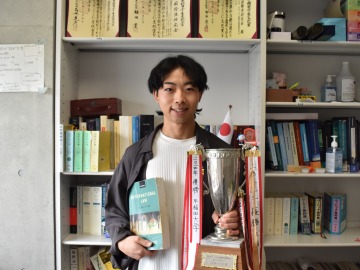
In the student club room at Toyama Campus Waseda University Student Center
Nakahanada is a member of the student club International Law Study Group and has achieved outstanding results in domestic and international moot court competitions. Nakahanada won the domestic qualifying round of Jessup, the world's largest international law moot court competition, and competed in the world competition held in Washington DC in April 2024. Nakahanada has also continued to achieve remarkable success, including participating as a member of the Japanese team in the Manfred Lacus Space Law Moot Court Competition Asia-Pacific Qualifying Round, where space law is discussed. We spoke to Nakahanada about what made him interested in law, what impressed him at the moot court competition, and his future plans.
--Please tell us why you decided to study law at Waseda University and what prompted you to participate in the moot court competition.
I have been interested in working for an international organization since I was in high school. When I was searching for ways in which I could get involved, I was drawn to the legal aspect. I felt that legal rule-making plays an important role in maintaining an orderly and livable society in the international community, and I decided to go to School of Law to learn more about it.
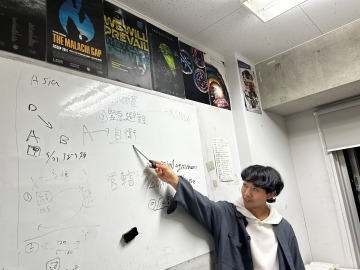
Deepening discussion on the theme of the mock trial in the club room. Lively discussion among student club members
After entering university, I wanted to deepen my learning through student club activities, so I joined the International Law Study Group. I was impressed by how my seniors worked as a team to take on the moot court competition and achieve victory, and I began to want to get more involved.
--Please tell us about the specific content of the moot court competition and what is most exciting about it.
International law moot court is a team competition in which the plaintiff and defendant each come up with their own arguments on the subject of a dispute between sovereign nations, and the winner is determined by the logic and persuasiveness of their arguments and the performance of their arguments. The process leading up to the day of the moot court is as follows: first, team members thoroughly research the theme set for each competition, compile their arguments into a document called a memorial, and submit it in advance. On the day of the competition, the team's representative, the debater, presents their argument to the judge from the competition headquarters based on the memorial, and also answers questions from the judge. In the competitions I have participated in, all of these responses are given in English, so it also helps to hone your language skills. During the preparation period for the moot court, I was so absorbed in it that I went to the club room six or seven times a week.
The interesting thing about the moot court competition is the "back and forth with the judges." No matter how much you discuss and prepare in advance, there are many cases where you are asked to apply your thinking on the spot due to unexpected questions from the judges. I feel that this is both difficult and exciting. I also find it rewarding that you are asked to establish a basis for your argument that includes not only the interpretation of the underlying law, but also the political values of the sovereign nation on the theme, and then to give your own opinion on it.
--What is the most memorable event?
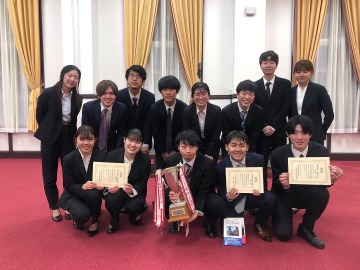
This photo was taken when they won the Jessup 2024 national qualifying round in Kyoto. Nakahanada is in the center of the front row.
I participated in the world's largest international law moot court competition, "Jessup," as a debater for two consecutive years, and led my team to victory in the national championship. Only four out of about 20 teammates are selected to debate in this competition. It is an honor, but also a great deal of pressure.
In my first competition, I ran as a debater despite being a freshman, and I felt a strong sense of disappointment and regret at how little I was up to. Thanks to my senior teammates, we won the national championship, but in the world competition in Washington DC, we placed 124th out of 135 teams, which was a disappointment. I regretted that my lack of knowledge and my inability to respond in English were what held us back.
From there, I made a determined effort, studying various legal themes and asking my teammates to play the role of judges to practice answering questions. In particular, when it came to English, I tried to focus on the main points and express them in my own words, rather than simply memorizing the Memorial. Thanks to that, I think I was able to think more flexibly and answer questions more quickly and accurately in my answering questions at the 2024 competition, my second year, compared to the previous year. After successfully winning the national championship, I was able to put up a good fight at the world competition, coming in 54th out of 143 teams, which was a valuable experience for me.
--You represented student club on the Japanese national team at the Manfred Lax Space Law Moot Court Competition Asia-Pacific Preliminary held in June 2023.
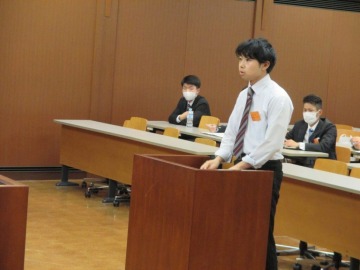
A debate during the tournament. The tension is even more intense when facing the judges.
Unlike "Jessup," which is contested by familiar student club members, the Manfred Lax Space Law Moot Court Competition was contested by a team of five people, including representatives from other universities. For example, we had a hard time communicating with the representative from Kyoto University, as we basically only communicated online until the day of the competition.
Another big difference from regular international law moot court competitions is that instead of discussing current issues, we mainly discussed issues that may arise in the near future. The theme of this competition was "Case Concerning Laser Activities and the Use of Anti-Satellite Weapons in Outer Space." Specifically, we discussed whether international law on Earth can be applied to activities in outer space, such as "If country A's satellite malfunctions and there is a possibility that it may cause damage to country B's satellite, does country B have the right to use force to protect its own satellite?"
The purpose is to think about and discuss in advance from a legal perspective how to resolve such a situation in the near future. Therefore, when thinking about our arguments, we not only looked at past cases, but also researched more advanced scientific knowledge outside of our field than ever before, and it was difficult to imagine various patterns of arguments. However, here too, we had members who we could rely on for research, and conversely, I took on the role of actively summarizing the arguments, so I think we were able to make preparations by utilizing each of our strengths.
This conference reaffirmed the need to accurately grasp the various conflicting structures representing the interests of nations and the international community when applying international law, and also demonstrated the importance of careful rule-making that takes into account all interests.
--Please tell us what you learned from participating in each tournament.
I was able to learn legal and logical thinking and how to use English, and these skills improved dramatically over the two years. Also, it was a very valuable experience to be able to debate legal matters with people from various countries through the moot court competition. For example, the debaters from China and India were very expressive and persuasive even at the competition. I think we were just as good at logical reasoning, but we learned the importance of the ability and the way to communicate that.
At international competitions, in addition to the moot court sessions, there are also opportunities for socializing. I think it was a very good experience to be able to see the differences in national character that I would not have noticed if I had stayed in Japan.
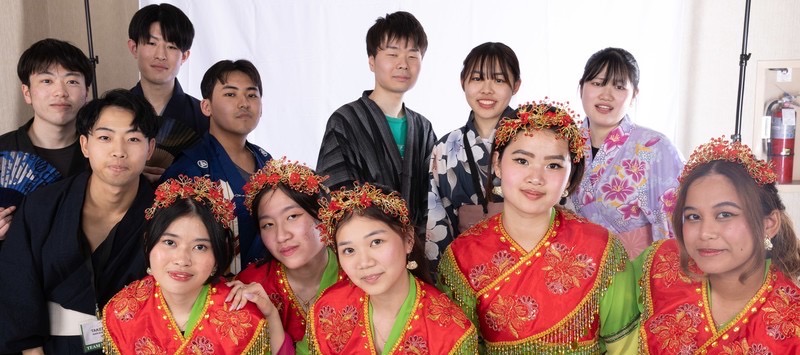
After the World Championships, there will be a "National Dress Party" where participants can wear traditional costumes from their own countries and have international exchange. The photo shows the exchange with the Indonesian team. Nakahanada is second from the left.
I also learned that in mock trials, communication among the whole team is important. I understand that beginners who have just joined may feel intimidated in terms of knowledge, but sometimes the opinions of beginners can be the perspective we need, so I would like to create an environment where we can share our honest opinions without worrying about grade levels or hierarchical relationships. I felt that the most important thing to have a good discussion is to build a relationship of trust, so next time, as a senior, I would like to actively work to improve our organizational strength.
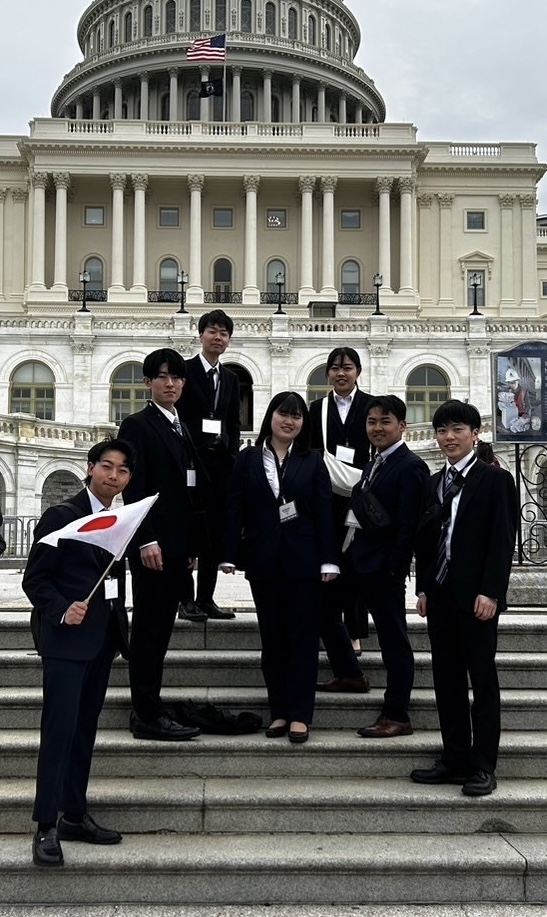
With teammates in front of the US Capitol in Washington DC, where the world championships were held. Nakahanada is on the far left.
--Please tell us about your future prospects.
I would like to lead the team and contribute to the further success of the Japanese national team at the world championships. Personally, I would like to graduate using School of Law 's "third-year early graduation system" and go on to graduate school overseas. After entering graduate school, I would like to deepen my academic study of international law and human rights law using English, based on the experience I have gained in moot court, in order to fulfill my future dream of working for an international organization.
No.876
Interview, text and photography: Waseda Weekly Reporter (SJC student staff)
Tanabe Saya 4th year School of Culture, Media and Society
【Profile】
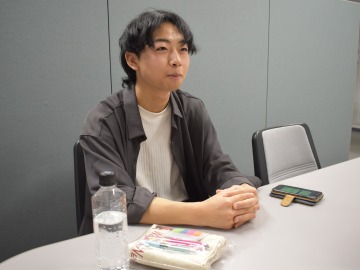
During the interview
Born in Tokyo. Graduated from Tokyo Metropolitan Minamitama Secondary School. His favorite Waseda meal is the ramen from "Chigauka." In high school, Nakahanada was a member of the Japanese drum club and won the Saga Prefectural Cultural Festival (national tournament) with Nakahanada's team.

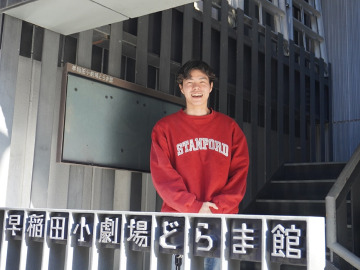
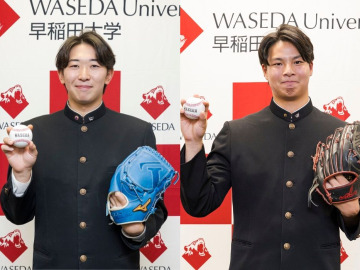
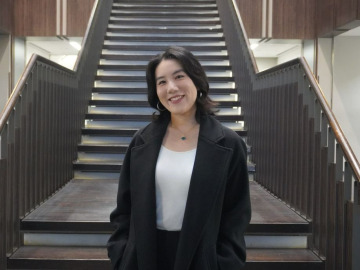


![[Save version] Map of the four main campuses](https://www.waseda.jp/inst/weekly/assets/uploads/2025/09/17cb2975123fc5103172ef60bd98608d-610x458.jpg)

